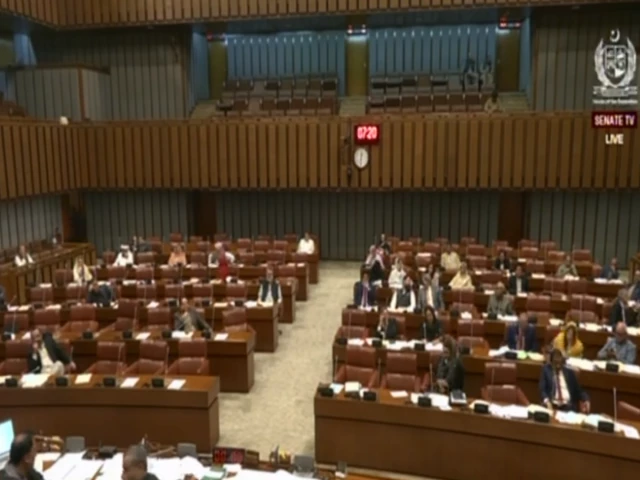The Chief of the Army will serve as Chief of the Defense Forces and eliminates the position of Chairman of the Joint Chiefs of Staff Committee.
Key legislation modifying military command was passed in the Senate on Friday, in line with proposed changes to the 27th Constitutional Amendment. The 27th Constitutional Amendment revised Article 243 and recast Pakistan’s military command hierarchy. The 27th Constitutional Amendment was passed in parliament this week amid strong opposition.
military command
- The mandate of the Chief of the Defense Forces will begin to run from the date of notification.
- The Chief of the Army will serve as Chief of the Defense Forces
- When a general is promoted to Field Marshal, he will serve according to paragraph 2 of the corresponding clause.
- The federal government will determine the duties and responsibilities of the Chief of the Defense Forces
- Clause 8G of the Army Act has been amended to abolish the post of Chairman of the Joint Chiefs of Staff Committee.
- The position will end on November 27.
The National Strategic Command
- The Prime Minister, on the recommendation of the Chief of the Army and the Chief of the Defense Forces, will appoint the Commander of the National Strategic Command for a term of three years.
- The PM will set the terms, conditions and rules for the appointment of the Commander of the National Strategic Command
- The Prime Minister may reappoint the Commander for an additional three-year term on the recommendation of the Chief of the Defense Forces.
- The appointment, re-election or extension of the Commander of the National Strategic Command cannot be challenged before any court.
- The retirement age, period of service and removal provisions under the Army Law will not apply to the Commander of the National Strategic Command.
- The commander of the National Strategic Command will serve as a general in the Pakistan army
Read: COAS Asim Munir’s tenure to be restarted after military command reforms
Pakistan Navy (Amendment) Bill 2025
The bill proposes to amend the Pakistan Navy Act, 1961. The amendments aim to align the existing laws with the 27th Constitutional Amendment. The law aims to reflect a multi-domain integration policy, to improve command coordination and organizational coherence across all defense forces.
- All provisions regarding the chairman of the Joint Chiefs of Staff Committee have been removed.
- The Navy’s command structure will be reorganized in accordance with the new defense framework
- Terminology regarding the powers and position of the Chief of Naval Staff has been updated.
- The word “or” will be replaced by “and/or” in various sections of the Navy Law.
- Sections 11D, 11E and 11F have been removed.
- Rule 208 has been amended to remove references to the Chairman of the Joint Chiefs of Staff Committee.
Changes in Pakistan Air Force Bill
- Sections 10D, 10E and 10F of the Pakistan Air Force Act 1953 have been removed.
- Section 202 has been amended to remove references to the chairman of the Joint Chiefs of Staff Committee.
Read more: The 27th Constitution Amendment Bill passes through the National Assembly with a two-thirds majority
Supreme Court (Amendment of Practices and Procedures)
- Bill removes section 191A of the Practices and Procedures Act
- References to “Constitutional Banks” have been removed from the law
- Article 5 of the Practices and Procedures Law is repealed.
- Modifications to section 2 of the Practices and Procedures Law are approved
- Any matter, petition, appeal or review before the Supreme Court will be heard by the most senior judge in terms of seniority.
- Or a judge appointed by the Chief Justice, part of a tribunal formed by the committee led by the CJ.
- If a member is unable to attend a committee meeting for any reason, the Chief Justice may nominate another SC judge to the committee.
- Committee decisions will be made by majority vote.
The 27th Constitutional Amendment
The bill introduces Pakistan Army (Amendment) Bill 2025, Pakistan Air Force (Amendment) Bill 2025 and Pakistan Navy (Amendment) Bill 2025 in the assembly, which were passed by majority votes. Chief of Army Staff Field Marshal Syed Asim Munir will see a reset in his tenure following his appointment as Chief of Defense Forces (CDF), confirmed on Thursday.
Also read: President signs 27th amendment bill into law
The changes to the Army Law convert the COAS into the CDF and eliminate the position of chairman of the Joint Chiefs of Staff Committee (CJCSC), adding that the term of the CDF would be five years from the date of its appointment.
The amendment further said that the tenure of the current army chief would restart from the date of his notification as CDF.
The changes also included the replacement of the CJCSC position with that of commander of the National Strategic Command (CNSC). They highlighted that the prime minister would appoint the CNSC on the recommendation of the army chief from among the army generals for a three-year term.




